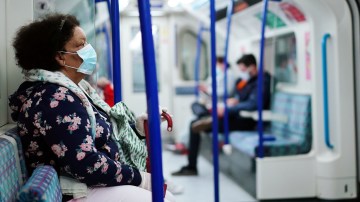The mandatory use of facemasks slows the growth in new cases of Covid-19 by 40 per cent, according to a German study that provides the best evidence yet for their use.
The research was able to use the staggered introduction of masks in shops and public transport across Germany as a natural experiment to test how effective they were. By looking at new cases in the days that followed, the researchers concluded that there is “strong and convincing statistical support” that the masks “strongly reduced the number of incidences”.
However, other scientists cautioned that the findings were still not robust enough to support the widespread use of masks, arguing that too many other factors could explain the results.
The study, published as a discussion paper for the Institute of Labour Economics, addresses one of the most controversial areas of science during the pandemic — one that has led to a split in opinion among researchers.
It will be compulsory to wear face coverings on public transport in England from Monday, and there have been calls to extend the rules to include shops, which can reopen next week.
Advertisement
When the government announced the move last week some scientists criticised the move on the grounds that there was still no good evidence that masks helped. Other groups argue the contrary, saying that even without strong evidence, there was a clear plausible mechanism for how even homemade cloth masks could stop onward transmission through droplets.
One reason it is hard to assess the effect of masks is because the type of person who uses them voluntarily may differ greatly in other behaviour too — as may also be the case in the type of country where their use is mandatory from countries where it is not.
The researchers, from Johannes Gutenberg University Mainz and the University of Southern Denmark, said that their study analysed the closest thing the world has had to a controlled experiment, and that it clearly showed their benefits.
On April 6 the German city of Jena introduced mandatory facemasks in shops and on public transport, and new infections plummeted. On April 20 Saxony followed, and also recorded a reduction in cases. In the next few days the rest of the country followed as well. This allowed the scientists to compare culturally similar regions at different times.
Their analysis concluded that the apparent early improvements seen in Jena were not a coincidence. “The early introduction of facemasks in Jena has resulted in a reduction of almost 25 per cent in the cumulative number of reported Covid-19 cases after 20 days,” they wrote. “The drop is greatest, larger than 50 per cent, for the age group 60 years and above.”
Advertisement
When collating data from the other regions they found a strong curve-flattening effect — with the growth in cases, as opposed to the total number of cases, cut by almost half. “This is a sizeable effect. Wearing facemasks apparently helped considerably in reducing the spread of Covid-19,” they said.
Jeremy Howard, research scientist at the University of San Francisco and an advocate of masks being worn — who was not involved in the research — said that the findings were striking: “You can see the dramatic and sudden divergence between Jena, and the average of other regions that had previously had similar results.”
He said that, when combined with another paper that found similar results when comparing countries, it was “the strongest evidence yet that, in practice, universal masking is the most powerful tool we have for stopping the pandemic”.
Antonio Lazzarino, from University College London, said he remained to be convinced. “This is a non-experimental study, so causal inference cannot be claimed,” he said, adding that he did not feel enough account had been made of other possible explanations. There are “too many assumptions,” he said.




